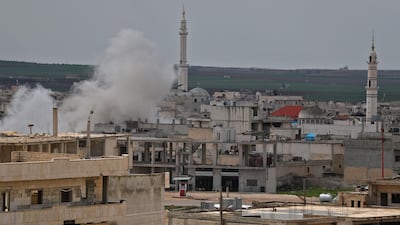A UK-led charity that has spent millions of pounds supporting vital public services in rebel-held Syria could be forced to divert its funding outside the country if the situation in Idlib, the final redoubt against the regime, worsens.
The Hands-Up Foundation, which devotes much of its energy to projects inside Syria run by locals, said Russia-backed regime advances had complicated the transfer of aid into the country.
Rebels, in particular former Al Qaeda affiliate Hayat Tahrir Al Sham, have been accused of taxing aid crossing from Turkey, with the UK’s Charity Commission warning charities could be indirectly financing proscribed groups.
One of Hands-Up’s founders said armed groups had not interfered with their partners on the ground, describing it as a “red line,” but conceded barriers to entry and implementation of projects had increased. Rose Lukas, its managing director, described a complex process that ensured goods and funds made their way into Syria without being tampered
“Should it become impossible or more difficult or risk increases we would have to consider pulling our funds out which would be incredibly sad,” said Ms Lukas.
“These places are just not going to be able to run and the worst thing is it will just open up the ground for the likes of HTS to take over.”
The UN has warned any offensive on Idlib risks causing a humanitarian disaster for the roughly 3 million people in the province. This includes a surge of 1.4 million Syrians who have already been displaced during the conflict including 1 million children.
Hands-Up raises money though a number of innovative ways that seek to show off the positive sides of Syrian culture such as its food. The funds are then transferred to organisations on the ground in rebel-held Syria. Beginning as a small group of Syria-loving friends in 2012, it has taken in over £4 million since becoming an official charity in 2014.
It supports a primary health clinic in the Aleppo countryside inside the rebel-regime buffer zone that caters to roughly 70,000 people. Hands-Up also works with a project on the Turkish-Syria border that focuses on prosthetic limbs and funds a medical training centre in Idlib city – but the reality of war has meant some of these have been closed at times when conflict surges.
“It’s a fine balance… but we are certainly going to move some of our funds to Lebanon to an education project to mitigate against the risks,” said Ms Lukas.
“Arguably, it was easier a few years ago,” she added, referring to when the opposition held larger chunks of territory and the border with Turkey was easier to cross.
Further complicating the situation is the Idlib lifeline, the Bab Al Hawa border crossing. Last year there were reports that the civilian administration linked to HTS was taxing aid conveys passing through.
“We had some conversations (with our partners) to ask them what they are doing. A, to make sure it hadn’t been taxed but also what reporting mechanisms they had in place. If something were to happen do all their staff and contractors know that’s not something they can do and B, that they report it back and make sure it doesn’t happen.”
“One of the most interesting things is that there’s a very strong pushback from civil society against armed groups interfering with their work. It’s quite a powerful thing,” she said.
“On the flipside HTS have made these gains recently – although my understanding is that this hasn’t made much difference. To date, none of our partners have had any issues with interference but that is a red line for them and us.”
The roots of hands up go back to Damascus in 2010, where Ms Lukas was learning Arabic. “For students or people working and weren’t doing anything inflammatory it was a very lovely place to live.”
As the Syrian Civil War began taking a deadly turn most foreigners fled. Describing a feeling of hopelessness, Ms Lukas and her friends set about creating what would become Hands Up with three friend other Syria-lovers.
It began with food – the Syrian Supper Club. “So much of Syrian culture revolves around food in the family. It’s about getting together, cooking together, sharing food, even the plates are all shared.”
“Fruit and vegetable markets in Damascus blew my mind because everything was so seasonal.
“Because of the Syrian food we loved and made but also the idea of sharing and bringing something positive from the Syrian culture to the UK instead of just the focus of the war.”
Syrian Supper Club events have now been held as far away as Australia and the east of coast of the USA.
The charity then evolved and put on singing events to raise money and marmalade inspired by Syria’s “own bitter oranges, and their trees which grow in the old city of Damascus,” according to its website.
Syria’s civil war now seems poised for a final, devastating ending as over three million people crowd into Idlib. The desire for aid is high but any assault by the regime could make any charities on the ground presence, not that this would break the dedication of those who want to help Syria’s suffering population.
“We will move elsewhere but we are not going to give up. The need for Syrian’s, wherever they are, is absolutely vast.


